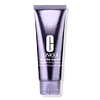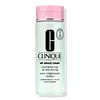Clinique Take The Day Off Facial Cleansing Mousse Versus Clinique All About Clean Liquid Facial Soap
What's inside
What's inside
 Key Ingredients
Key Ingredients

No key ingredients
 Benefits
Benefits

 Concerns
Concerns

 Ingredients Side-by-side
Ingredients Side-by-side

Water
Skin ConditioningMyristic Acid
CleansingGlycerin
HumectantSodium Methyl Cocoyl Taurate
CleansingPotassium Hydroxide
BufferingLauric Acid
CleansingBehenic Acid
CleansingPPG-24-Glycereth-24
EmulsifyingSodium Hyaluronate
HumectantSodium Acetylated Hyaluronate
HumectantButylene Glycol
HumectantCaprylyl Glycol
EmollientGlycol Distearate
EmollientPolyquaternium-7
Hexylene Glycol
EmulsifyingTetrasodium EDTA
Phenoxyethanol
PreservativeSodium Benzoate
MaskingCI 60730
Cosmetic ColorantWater, Myristic Acid, Glycerin, Sodium Methyl Cocoyl Taurate, Potassium Hydroxide, Lauric Acid, Behenic Acid, PPG-24-Glycereth-24, Sodium Hyaluronate, Sodium Acetylated Hyaluronate, Butylene Glycol, Caprylyl Glycol, Glycol Distearate, Polyquaternium-7, Hexylene Glycol, Tetrasodium EDTA, Phenoxyethanol, Sodium Benzoate, CI 60730
Water
Skin ConditioningLauramidopropyl Betaine
CleansingCocamidopropyl Hydroxysultaine
CleansingSodium Chloride
MaskingSodium Laureth Sulfate
CleansingSodium Cocoyl Sarcosinate
CleansingTea-Cocoyl Glutamate
CleansingButylene Glycol
HumectantAloe Barbadensis Leaf Juice
Skin ConditioningPEG-120 Methyl Glucose Dioleate
EmulsifyingSucrose
HumectantSodium Coco Pg-Dimonium Chloride Phosphate
CleansingCitric Acid
BufferingHexylene Glycol
EmulsifyingPolyquaternium-7
Caprylyl Glycol
EmollientDisodium EDTA
Methylchloroisothiazolinone
PreservativeMethylisothiazolinone
PreservativePhenoxyethanol
PreservativeWater, Lauramidopropyl Betaine, Cocamidopropyl Hydroxysultaine, Sodium Chloride, Sodium Laureth Sulfate, Sodium Cocoyl Sarcosinate, Tea-Cocoyl Glutamate, Butylene Glycol, Aloe Barbadensis Leaf Juice, PEG-120 Methyl Glucose Dioleate, Sucrose, Sodium Coco Pg-Dimonium Chloride Phosphate, Citric Acid, Hexylene Glycol, Polyquaternium-7, Caprylyl Glycol, Disodium EDTA, Methylchloroisothiazolinone, Methylisothiazolinone, Phenoxyethanol
 Reviews
Reviews

Ingredients Explained
These ingredients are found in both products.
Ingredients higher up in an ingredient list are typically present in a larger amount.
Butylene Glycol (or BG) is used within cosmetic products for a few different reasons:
Overall, Butylene Glycol is a safe and well-rounded ingredient that works well with other ingredients.
Though this ingredient works well with most skin types, some people with sensitive skin may experience a reaction such as allergic rashes, closed comedones, or itchiness.
Learn more about Butylene GlycolCaprylyl Glycol is a humectant and emollient, meaning it attracts and preserves moisture.
It is a common ingredient in many products, especially those designed to hydrate skin. The primary benefits are retaining moisture, skin softening, and promoting a healthy skin barrier.
Though Caprylyl Glycol is an alcohol derived from fatty acids, it is not the kind that can dry out skin.
This ingredient is also used as a preservative to extend the life of products. It has slight antimicrobial properties.
Learn more about Caprylyl GlycolHexylene Glycol is a surfactant. Glycols are a class of alcohols. Hexylene Glycol is a surfactant and emulsifier.
As a surfactant, Hexylene Glycol helps gather dirt and oil on your skin to be washed away.
As an emulsifier, Hexylene Glycol helps keep water and oil together. This prevents them from separating in a product. Hexylene Glycol also thins out the texture of a product by lessening viscosity.
Hexylene Glycol has a small molecular weight.
Learn more about Hexylene GlycolPhenoxyethanol is a preservative that has germicide, antimicrobial, and aromatic properties. Studies show that phenoxyethanol can prevent microbial growth. By itself, it has a scent that is similar to that of a rose.
It's often used in formulations along with Caprylyl Glycol to preserve the shelf life of products.
Polyquaternium-7 is a light to clear colored liquid. It is commonly found in haircare products for its film-forming and anti-static properties.
According to a manufacturer, it is a non-paraben and specially developed for negatively charged surfactant systems. This makes it a great hairstyle holder and helps to improve wet hair detangling without adding buildup.
Water. It's the most common cosmetic ingredient of all. You'll usually see it at the top of ingredient lists, meaning that it makes up the largest part of the product.
So why is it so popular? Water most often acts as a solvent - this means that it helps dissolve other ingredients into the formulation.
You'll also recognize water as that liquid we all need to stay alive. If you see this, drink a glass of water. Stay hydrated!
Learn more about Water